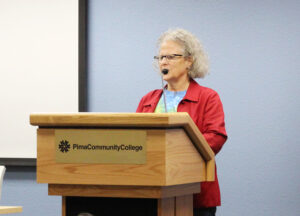
By AMARIS ENCINAS
On March 7, the Downtown Campus hosted Speaking Out: A Day of Inquiry and Exploration, which was an event that focused on the featured work of American writer Audre Lorde.
To kick off the event, Sandra Shattuck, Pima Community College instructor in Communications, shared some words about the late Lorde and how she changed the way people discuss social justice issues.
“I just want to give everyone a round of applause for ever everyone here today because showing up today is 90 percent of the work,” Shattuck said. “Audre Lorde developed theories, analyses and practices of intersectionality before the term existed, so to use a Western African political designation she is the Queen Mother of Intersectionality. She’s not alone, but if she were here today, she would say that she does not stand alone there is a whole community that stands behind her.”
The event was created in observance of African-American History month and Women’s History month. Pima Community College decided to extend an open invitation to faculty, staff, students to discuss and explore the theme of speaking out. “Speaking out” in this case means what it means to experience, define and reflect on the road taken. The decision to act or not act and where that marks the life of an individual.
The whole event was coordinated by Brooke Anderson, instructional faculty for the Writing Department at Downtown Campus, and the theme behind the event was suggested by Marcos Trujillo, an instructor who teaches for the Social Sciences Department at East Campus.
Trujillo described Lorde as a “classic black and lesbian feminist” who is talking about how we appreciate our differences. They said she used that as a strength as opposed to seeing it as something negative.
“That is not only important but especially for our students to see all of the diversity in their classrooms,” Trujillo said.
The event took place in the Amethyst Room at the Downtown campus from 10 a.m. to 4:30 p.m. March 7. The day was outlined by defining the theme and introducing Lorde, which was led by SOC 120, WRT 101 and WRT 102 in breaking down “Current Social Problems.” This was followed by SPA students exploring the theme and what it means to them personally.
The discussion and close reading of Lorde’s “Transformation of Silence into Language and Action” was led by LIT 280 and WRT 102 students. Lunch was served and provided by Student Life and accompanied by Pima Community College music students. There also was a Creative Writing hour led by AZ Martinez.
Guest speaker Linda J. Lumsden, professor and creative director of graduate studies from the University of Arizona School of Journalism, closed out the event.
Lumsden discussed her new book, “Journalism for Social Justice: A Cultural History of Social Movement Media from Abolition to #womensmarch.” ANT/GWS 202 provided input and collaboration. At the end, Speaking Out scholarship finalists were recognized, and an awards reception took place.
For Anderson, the inspiration behind this event specifically was created, “partially from the impact of the #metoo movement and the ways in which we hear people trying to have a voice. Well, not trying, but actually speaking out, and we thought man what an important topic for us to make space for our students to think about this theme and to speak out themselves.
“I think it’s important not only to know but to have a sense of our own personal identities and being able to recognize where we might have some privileges compared to other people,” Trujillo said. “Because when we know that people of different races, different genders, or different documentation statuses are treated differently, the more we’re able to understand what we bring to the table.
“We can use that to help other people and maybe not hold it against them if they have a different experience but just being able to appreciate who we are and who they are,” he added.
This event has provided the groundwork for allowing students to take part in an active discussion about their place in society and welcomes the diversity in experience that every student has to offer.
